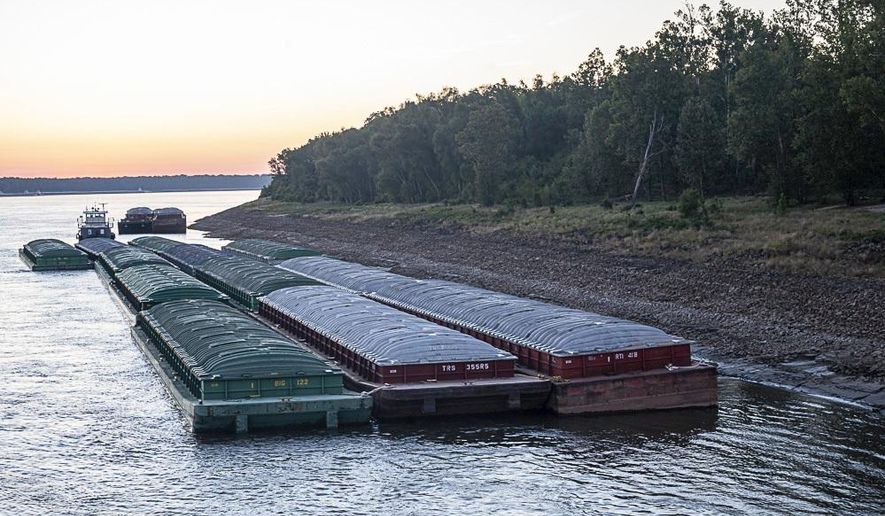The unusually low water level in the lower Mississippi River is causing barges to get stuck in mud and sand, resulting in delays for shippers, recreational boaters and even passengers on a cruise line.
Lack of rainfall in recent weeks has left the Mississippi River approaching record low levels in some areas from Missouri south through Louisiana. The U.S. Coast Guard said at least eight “groundings” of barges have been reported in the past week, despite low-water restrictions on barge loads.
One of the groundings happened Friday between Louisiana and Mississippi, near Lake Providence, Mississippi. It halted river traffic in both directions for days “to clear the grounded barges from the channel and to deepen the channel via dredging to prevent future groundings,” U.S. Army Corps of Engineers spokesperson Sabrina Dalton said in an email.
As a result, dozens of tows and barges were lined up in both directions, waiting to get by. The stoppage also brought a halt to a Viking cruise ship with about 350 passengers on board, said R. Thomas Berner, a Penn State professor emeritus of journalism and American studies, and one of the passengers.
The Viking ship was originally supposed to launch from New Orleans on Saturday, but the water there was so low that the launch was moved to Baton Rouge, Louisiana, Berner said.
By Tuesday, the ship was halted near Vicksburg, Mississippi, due to the backup caused by the grounding. It wasn’t near a dock so passengers couldn’t leave. The ship’s crew kept people entertained as much as possible with music, games and other activities.
“Some of us are taking naps,” Berner joked.
The stuck barges were freed midday Tuesday. Berner said the cruise ship restarted Tuesday night. It’s due to arrive in St. Paul, Minnesota, on Oct. 15 .
Nearly all of the Mississippi River basin, from Minnesota through Louisiana, has seen below-normal rainfall since late August. The basin from St. Louis south has been largely dry for three months, according to the National Weather Service.
The timing is bad because barges are busy carrying recently harvested corn and soybeans up and down the river.
Lucy Fletcher of the agricultural retailer AGRIServices of Brunswick, who serves on the board for the St. Louis-based trade association Inland Rivers, Ports & Terminals, said navigation woes on the Mississippi, Missouri and other major rivers have some shippers looking at other means of transportation.
“Can they divert to rail?” Fletcher asked. “Well, there’s not an abundance of rail availability. And usually people are booking their transportation for fall early in the season. So if they haven’t booked that freight already, you’re going to see people in dire straits.”
Fletcher said that with the supply chain still snagged following the COVID-19 pandemic, trucks also are largely booked and unavailable.
To keep river traffic flowing, the Corps of Engineers has been dredging the Mississippi at several spots and placed limits on the number of barges each tow can move.
Last week, Corps officials in Louisiana said the low river level was allowing salt water from the Gulf of Mexico to creep up into the Mississippi. They planned an underground levee aimed at keeping salt water out of water treatment plants. The shallow water also forced the mid-September closure of a ferry that carries vehicles across the Mississippi River between Kentucky and Missouri.
The forecast for much of the Mississippi River basin calls for continued dry weather in the near future. Fletcher is hopeful the winter will bring some relief.
“We need a good year for lots of snow melt,” she said. “The whole system’s just going to need some water.”




Please read our comment policy before commenting.